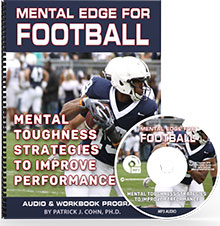
How to Stay Mentally Tough in Football
Most athletes pay no attention to purposefully training their minds. Instead, these athletes leave their mental response to chance.
You want to consistently train your brain by sending yourself positive messages. If you are not actively training your brain, you passively train your brain. That is, whatever messages pop up in your mind, either negative or positive, will affect future performances.
For example, if you haven’t actively trained your brain and a referee or official blows a call, your mental response may be, “This always happens to me. The officials are out to get me. The officials are favoring the other team.”
This negative response will cause you to become frustrated and angry. You will not be able to focus, and you will make more mistakes.
In the same situation, you can train your brain to respond with mental toughness, “No matter what the official does, It doesn’t matter. I can handle anything.”
If you keep sending yourself consistent empowering messages, you will respond with mental toughness automatically.
The best way to train your brain to handle adversity is…
To learn to cope with adverse conditions in practice and respond positively. In other words, respond the way you want to react in competitions.
The strategy was put into play by Mario Cristobal, head coach of the University of Miami football team. Cristobal tested his team in their first spring scrimmage. Cristobal manufactured adversity for the offense by having officials throw flags on the offense to see how the group would respond.
From the very first practice, Cristobal conveyed to his team that self-messages train your brain, which determines your level of mental toughness and quality of play.
CRISTOBAL: “Is it going to be hands up, ‘Oh, man, that’s BS,’ or is it going to be, ‘Let’s roll, let’s find a way.’ We’ve got to build our minds to the point where it doesn’t matter what the previous play brought…
Mentality and identity are at the forefront of everything we do. There’s no bad play, no injury, no circumstance that we can’t overcome. We’ve got to get there mentally.”
You never want to leave your mental game to chance. You control how you respond in adversity by conditioning your mind.
If you want to play hard when you are tired in competitions, you can train your brain by pushing yourself hard at the end of practice and sending yourself strong messages:
“I will outwork everyone at the end of practice. I will work hard until the very last second. Nothing can stop me.” The key is to train your brain actively.
Training your Mind to Cope with Adversity
You can learn to cope with adversity by imagining scenarios you might see during a game and how you will cope with it, such as going into the game cold on short notice.
Start by thinking about what might be challenging for you during a game. An interception? Missing a tackle? Harsh weather conditions?
Next, how will you cope with each situation so that you can perform your best despite the challenge?
Related Sports Psychology Articles
- How to Deal with External Noise
- Mental Toughness Test in Football
- How to Use Jim Harbaugh’s Finishing Mindset
*Subscribe to The Sports Psychology Podcast on iTunes
*Subscribe to The Sports Psychology Podcast on Spotify
Download a free sports psychology report to improve your mental game!
Learn more about our one-on-one mental game coaching.
The Mental Edge for Football

Are you (or your athletes) performing inconsistently in games with less confidence in games than in practice? Do you lose confidence easily after a couple of blown plays? Do you become so frustrated with your game that you can’t focus on the next play? If you answered yes to these questions, it’s a good bet that your mental game might prevent you from consistent performance in games.
“The Mental Edge For Football” is a complete brain dump of the TOP eight mental training sessions we teach our football players to help them boost their mental game and improve consistency – from how to mentally prepare for games to performing under pressure to building unstoppable confidence.